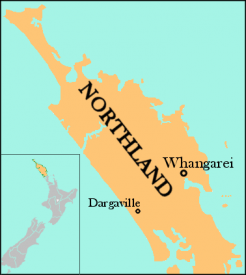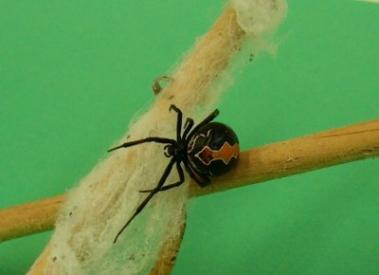I'm an aficionado of getting out into the great outdoors. Walking in the back country goes by many different names, depending on where you live. Hiking, rambling or bushwalking are some common terms, but in New Zealand we call it tramping, and people who do it are known as trampers.
A few years ago, I was fortunate to go tramping in Canada, mainly in the Jasper, Lake Louise, Banff area. One of the notable differences between Canada and New Zealand was how alert you have to be for dangerous wildlife. You see, in New Zealand, we don't have snakes, bears, moose, elk, porcupines, or indeed any mammals or reptiles that constitute a serious danger to life or limb.
Indeed, on a tramp in the New Zealand bush, the most common fauna are birds, with the occasional sign of opossums which are regarded as noxious pests in this part of the world, given that they have no natural predators, and constitute a major risk to the flora which they decimate.
So, it was with some irony that I read the following story which has appeared in the NZ news media today:
Katipo bites skinny-dipping touristA venomous katipo spider bite on his penis was the high price a tourist paid for a skinny-dip at a Northland beach.
The 22-year-old Canadian left his clothes in the sand dunes while he went for his nude swim and slept on his return, according to a report on the case in today's online NZ Medical Journal.
"He woke to find his penis swollen and painful with a red mark on the shaft suggestive of a bite. He rapidly developed generalised muscle pains, fever, headache, photophobia [light sensitivity] and vomiting," wrote Dr Nigel Harrison and colleagues who treated him at Dargaville and Whangarei hospitals.
By the time the man reached Dargaville Hospital, his penis was severely swollen, his blood pressure was up and his heart beat racing.
Chest pain and other symptoms developed the next morning and it was presumed he had been bitten by a katipo. He was treated with anti-venom medicine and rapidly improved.
However, heart problems persisted and he was treated at Whangarei Hospital and Auckland Hospital before returning to Canada.
Katipo spiders are known to have a highly specialised habitat in New Zealand sand dunes and will bite only rarely, and in defence.
This was the first known case of myocarditis, or heart inflammation, caused by a bite, Dr Harrison said.
A prompt diagnosis and the use of anti-venom resulted in a good outcome for the tourist, he said.

It would seem that a katipo spider nestled in this guy's underwear while he swam, and then went unnoticed when he redressed.
So, if you're ever in New Zealand near sand dunes, beware of katipo spiders. FWIW, I've lived here for more than 50 years, and I've never seen one, despite spending a reasonable amount of time in their habitat.
Notes:
There are a number of west coast beaches north of Dargaville.
Driving from Dargaville to Whangarei takes about 45 minutes.
Whangarei is pronounced Fain ga ray and translates as cherished harbour
(Many Māori dialects pronounce ‘wh’ as an ‘f’ sound.)
Predatory Species



Comments
I always understood ...
... that one of the great things about New Zealand (and there are many) was that there were no 'nasties' that threaten humans. Obviously that's not strictly true. Apart from a brief stop over in Auckland airport my only experience is on South Island so perhaps we were safe from penile attack :)
However it's certainly true that opossums are widely disliked. Is it true that they're all flat? Certainly the only ones we saw were very flat and more or less incorporated into the road surface. We did stop at a cafe on the west coast where all the seats were covered in 'possum fur which slightly offended my vegetarian instincts :)
In the unlikely event we ever cycle tour there again I'll take care to shake out my shorts before donning them each morning. I haven't got much but I'd prefer not to lose it.
Robi
Roadkill
In my experience, most of the "flat" possums you saw would have been hit by vehicles.
Only a few times when tramping have I seen live possums. They're mainly nocturnal. I remember one occasion when a dog (a terrier) from a neighbouring farm decided to accompany us on a tramp, despite our best efforts to encourage it not to do so. It 'treed' a possum in a fairly low fern (1–2m), then leaped up and caught it, before literally tearing it apart. Had the dog not been present, I doubt that we'd have even seen the possum.
In general it's true that there are no 'nasties' that threaten humans in New Zealand: this guy was really unlucky and katipo bites are incredibly rare. There are also one or two plants like ongaonga (tree nettle) to be avoided (Poisonous native plants) but even that's quite rare.
Indeed, the worst problems I've had while tramping in the New Zealand bush have come from me falling over (or down a cliff in one instance).
Preventable Situations
Bike Archive
Bike Resources
Penile swelling?
I'm sorry for his pain but dude there are better ways to fix ED.
Bailey Summers
An alternative to Viagra??
Hmmmm... Does Pfizer know about this spider? If they do it may soon be extinct - Pfizer will brook NO competition! (I get an average of four spam from them every day.)
with love,
Hope
with love,
HER
Once in a while I bare my soul, more often my soles bear me.
I suspect there are venomous
I suspect there are venomous spiders everywhere except Antarctica - they're small enough to float in on storms.
Possums are considered a nuisance and pest here as well; I don't think there's much of anything that likes to eat them.
You know, you really don't have to keep a close eye out for moose, elk, porcupines, or beavers. They're not inherently aggressive, except certain times of the year. Most of the time, just don't step on them (beavers/porcupines). Skunks, on the other hand... (also, there aren't that many poisonous snakes that you watch out for in most of Canada. It's just not good 'snake country' )
I'll get a life when it's proven and substantiated to be better than what I'm currently experiencing.
Possums and snakes
Arkansawyers are the natural enemies of possums, we like to eat them after berry season roasted with onions, cabbage, turnips and sweet potatoes. Works good with snakes, too. :)
I read once that Canada has only one poisonous snake, the massasaugua (pygmy rattler), though I wouldn't be surprised to run into timber or prairie rattlers in Alberta no matter what the school books say.
Hugs,
Erin
= Give everyone the benefit of the doubt because certainty is a fragile thing that can be shattered by one overlooked fact.
= Give everyone the benefit of the doubt because certainty is a fragile thing that can be shattered by one overlooked fact.
Of Possums and Arkansawyers
... Sorry, this is totally and completely off-topic, but this comment reminded me of something my dad went through with an exceptionally crafty possum a few months ago. It made me laugh, so I just had to share :-D
This little pest had been getting into the garage and raising cain, and somehow crawled up under the house, getting into our heating ducts and driving the dog crazy. So dad decided he was going to set a (humane) trap for the little beast.
He baited this cage every day for a week, and every day, he'd check it to find that the bait was always gone. The next day he set the trap, went back in the house to get some more bait (sardines, I think), but forgot about it.
The next morning we heard this unearthly racket coming from outside. He went to investigate and found a furious possum in the un-baited cage. :-D
Coon problems
Daddy was lucky it wasn't a raccoon! Nasty, vicious varmints. They were a big problem at the Boy Scout camp up by Grand Lake in Oklahoma. Kids just love to stash snacks in their tents, and the coons quickly learned that all those forest green tents were ala carte diners. One kid actually tried to snatch his candybar stash back from a coon one night and ended up with a badly-mangled hand. Not a pretty sight, so I'm told.
The coons were no match for the timber rattlers, though. Those suckers got B-I-G around there! And mean!
Karen J.
"Being a girl is wonderful and to torture someone into that would be like the exact opposite of what it's like. I don’t know how anyone could act that way." College Girl - poetheather
“When a clown moves into a palace, he doesn’t become a king. The palace becomes a circus.” - Turkish Proverb
Camping with the Coons
We were camping on Mt Palomar in the late sixties and during the evening, Dad decided to make some popcorn. He got out the popper basket and put some corn in it and held it over the fire. My brother and I sat in some folding chairs near him to watch when we noticed across the fire, three small raccoons had shown up and sat on the log over there. When the corn was popped, we put some in a paper bag and gave them their share and a cup of water. They dunked the corn in the water and happily ate along with us then left when we had no more corn. :)
Hugs,
Erin
= Give everyone the benefit of the doubt because certainty is a fragile thing that can be shattered by one overlooked fact.
= Give everyone the benefit of the doubt because certainty is a fragile thing that can be shattered by one overlooked fact.
Aculturized?
I think that's the term. Raccoons are smart buggers, and the ones around the lake have become aculturized (if that's the right term) to people. It's a darn sight easier to hang around people for your eats than go out and find or catch your dinner. Like bears, coons will find your food and then regard it as their food; and they will fight to keep it. They don't have to be rabid to be dangerous.
They know they can survive
Hah, call that a nasty?
Why I could.... oh sorry, having a Monty Python moment. Looks sort of Redbackish or Black Widowish, wonder if it's a relative?
As for blow ins, well one place I take the pups for a romp I often came across the strewn remnants of a possum courtesy of the local foxes. Don't get me started on them or bunnies or cane toads or assorted plants... a touch of home courtesy of those 'invaders' from blighty. Won't go there either... err,actually the cane toads were 'scientifically' introduced, ummm...
Kristina
Definitely related
Hi Kristina
Extract from the Wikipedia item referenced in the original blog article:
So your opening paragraph was right on the money.
Po is the Māori word for night.
Kia pai to po. [Have a good night!]
Poisonous Spiders
Bike Archive
Bike Resources
I Heard There Was A Rush On
I'm told that genitally challenged males are flocking to the Northland beaches of New Zealand and lying down naked with their legs spread and their fingers crossed. Is that true? Or is it just another ploy by Tourism NZ to attract visitors?
Joanne
VBG
If there's a rush on, it's news to me.
Mind you, there's bound to be the odd person (pun definitely intended) who might put their health and life at risk for natural genital improvements.
As for Tourism NZ, what is it that they say about any publicity being good publicity? I think that's certainly true.
Probably Sandy
Bike Archive
Bike Resources